Hidden Dangers of Teflon Cookware: What You Need to Know
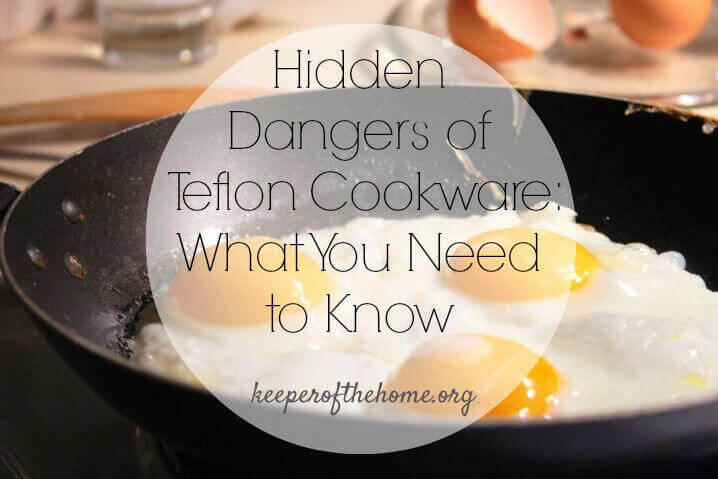
By Beth Ricci, Contributing Writer
I grew up with many of my meals lovingly cooked in a Teflon frying pan, and I’m willing to bet you probably did, too. But are those frying pans the healthiest choices for our families? Is there new information on the scene that might give us reason to doubt the stovetop wonders?
What are the hidden dangers of Teflon cookware?
A brief history lesson…
“Teflon” is the brand name for polytetrafluoroethylene (PTFE), a man-made chemical accidentally invented in 1938 while Roy Plunkett was attempting to create a new refrigerant. The substance that he created instead was noted to be extremely slippery and non-corrosive, which launched it into much experimentation for various uses, including the famous Teflon pans.
Today Teflon (and other brands of the same thing) are being used in tons of products for non-stick and stain-resistant purposes, such as electrical wire, light bulbs, hair products, window films, and more. It is used by major brands including Gore-Tex, Stainmaster and ScotchGuard.
It seemed to be the perfect solution, especially for cookware – it allowed food to not get stuck to the pan as it cooked, and it was heat-resistant for stovetop use.
It is apparent that Teflon – for better or for worse – changed the world.
It was a marketer’s dream, really. Take a universal problem (food sticking to the frying pan) and a brand new revolutionary solution (extremely slippery heat-resistant substance for coating the pan), and watch the profits roll in. Fabulous.
Personally, if I had been in that theoretical marketing meeting way back in the 50’s when this eureka moment came about I would have likely been the lone ranger party pooper with my one teeny tiny question…
“But is it safe?”
Indeed, medical and health research saw mind-blowing progress in the twentieth century, but I firmly believe that it is now just beginning to discover a more holistic approach to how thing in our environment, our diet, our products, our genetics, our pharmaceuticals all work together and work against one another in contributing to our overall state of health.
Teflon-coated cookware is a perfect example. Now that we’ve been using it for half a century, it is ingrained in our minds as normal and acceptable. The average person in our society doesn’t even consider that the pan they used to fry their eggs this morning could be having a hazardous effect on their family’s health.
Consider these findings:
- There have been recent studies showing that the safety of using Teflon is – at best – tenuous. The EWG states: “Manufacturers’ labels often warn consumers to avoid high heat when cooking on Teflon. But EWG-commissioned tests conducted in 2003 showed that in just two to five minutes on a conventional stove top, cookware coated with Teflon and other non-stick surfaces could exceed temperatures at which the coating breaks apart and emits toxic particles and gases.”
- In addition, “PFCs have been found in nearly all Americans tested by federal public health officials. Chemicals from this family are associated with smaller birth weight and size in newborn babies, elevated cholesterol, abnormal thyroid hormone levels, liver inflammation and weakened immune defense against disease” (source).
- Roughly 90 percent of people carry PFOA in their blood; it is also found in polar bears, human sperm and at ocean depths of 3,000 feet.
- British researchers used nearly 4,000 samples taken through the U.S. Centers for Disease Control and Prevention’s nationally representative National Health and Nutrition Examination Survey, which tests blood and urine levels for various chemical contaminants. Running the numbers, they discovered that people with higher concentrations of PFOA in their blood were more likely to report a history of thyroid disease. (source)
I could go on, but why bother? Some will dismiss this all as alarmist ranting and raving, to be sure. But if you use a little bit of common sense, the wisest choice is clear.
Do you know how many health risks and scary-sounding studies and crazy potential health risks are associated with glass cookware? Cast iron? Stainless steel?
Zero.
I can’t tell you with upmost certainty that Teflon absolutely causes xyz disease. I can tell you, however, that the choice is pretty well a no-brainer for me.
Materials used for centuries–natural materials created by God vs. chemicals invented in a lab with plenty of shady ties to major health concerns? I’ll take my cast-iron pan any day of the week, thank-you very much.
How about you?

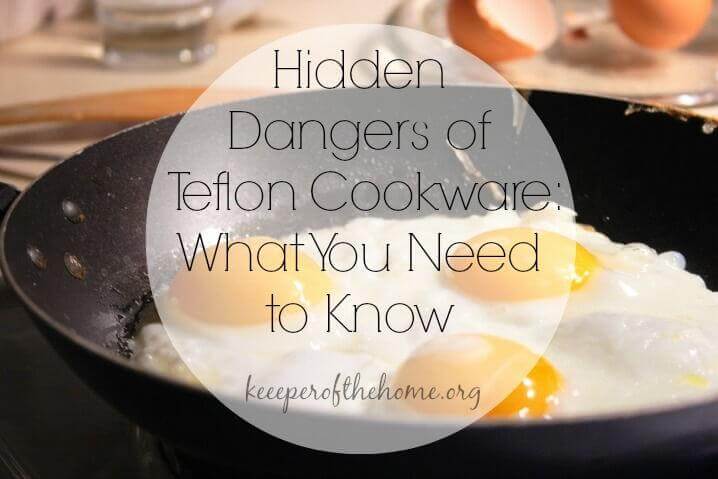
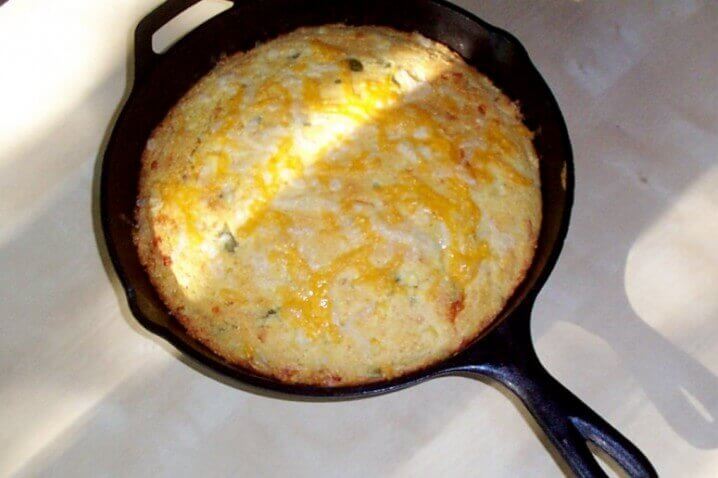
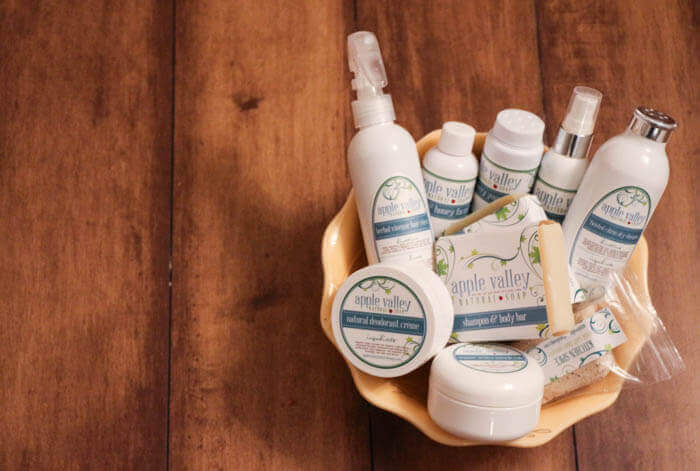


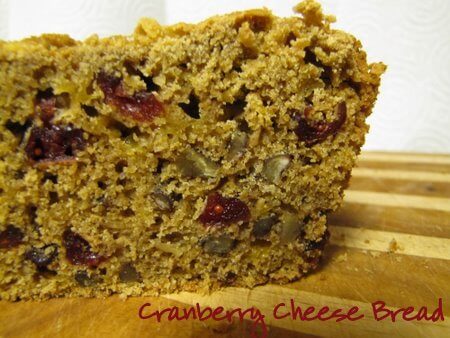
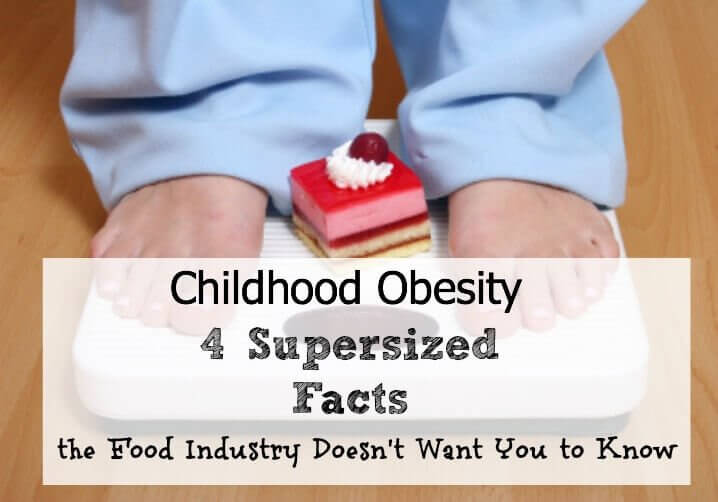
I am so glad to see this article! I wish we could paste it where the world could see it! Yes, I’ve known about these hazards of non-stick coating for years. I too use cast iron for most of my cooking., and I also have a couple of glass pots and a stainless steel piece or two. The problem is, you can’t eat out or go to family or friends’ house to eat without someone using this stuff. RRRRRRRRRRRRRR and there’s the microwave…
Not to mention how bad it is when it gets scratched…. I have heard that releases more toxins… and who doesn’t have a non-stick pan that is in perfect condition without ANY scratches?
I do know about the dangers, but I have one (non-scratched!) Teflon pan that I use ONLY for cooking eggs. I’m working on making my cast iron pans slick enough to be able to cook eggs in them!
What are your thoughts on the safety of pans with ceramic coatings?
As far as I have read, that’s another safe option. I haven’t tried them because I’ve been more than happy with my cast-iron 🙂 It might be a good option for anyone suffering from high iron (not too common these days, but it happens), as another commenter mentioned.
I want to thank you so much for all the information you provided in this blog. I want to tell you that I completely agree with you. It is very important not just the food we eat but also how we prepare our meals. As a Pampered Chef Consultant I will have to make a point to bring this up at all my shows. Sometimes I forget that I am meeting new people and they don’t know the information that I know.
Thank you again.
We use only Cast iron, Stainless steel and stone ware. No way would we use non-stick to cook on. Good article. 🙂
Hi Beth! Well I have been using very little teflon but one thought I had is this. I read on Mercola’s site that the danger comes when teflon temp goes over 400 degrees. I don’t typically cook food that hot. What do you think about that and did you read that in your research? Thanks!
I did read that the dangers were from the heating, and not from the flaking bits (as is commonly thought), but I don’t recall reading a specific temperature. Personally, as it is a man-made chemical with all kinds of shady implications, I’d rather just stick with cast-iron or stainless steel. I wouldn’t be surprised to see companies/studies arguing over that specific temp, and then of course they could just change it altogether at the drop of a hat. For me, there’s absolutely no reason I *need* Teflon to cook with, you know? 🙂
Great article, Beth! I couldn’t agree more! I was blessed two Christmas’ ago with an amazing set of Stainless All Clad. It was like a dream come true! Cooking is a joy with all-clad. But can you believe I don’t have a simple cast iron skillet??? It’s crazy. LOL! But, I’m hoping to finally get one for Mother’s Day. I would LOVE your recommendation (and reader suggestions as well) on a good quality cast iron brand! Thank you! Blessings, Kelly
I scoured thrift shops for a year and finally was lucky enough to find a beautiful old cast-iron pan, perfectly seasoned. I also have a Lodge one that is pretty great – they are definitely a popular, but affordable brand. 🙂
I have been buying ceramic coated frying pans which are PFOA/PTFE free, also called Green pans. They are becoming more common in box stores, but for the best prices, check out Winners or Home Sense in Canada, Marshall’s in the US. Last year my family was blessed to be checked out at a Bio-Identical hormone/Functional medicine clinic. The men iron levels were dangerously high, and I was way too low due to heavy periods. If I was only cooking for myself, I would still use them, but my family members definitely cannot. I love my lightweight, ceramic coated, non-stick, health-friendly pans!
I meant to say the men in my family were found to have too high iron levels, and it was recommended we stop using cast iron pans as too much iron was getting into the food, especially acidic foods like tomatoes. We love the ease and performance of the ceramic coated pans. They are way lighter too!
“Slow death by Rubber Duck” is a great book and it has a chapter based on teflon, not only in cookware but as a stain repellant in clothing.
it goes on to speak of three women that worked at the plant, all three of which babies were born with birth issues ( low weight/ defects). One of the children was born with an eye defect never seen before and solely related to the mother working so closely with the teflon process, to no fault of the mother, moreso due to the effects unknown or simply the ignorance of the employer/company to inform their employess of such associated health risks to themselves or unborn children/fetuses.
Thank you for the posting!
I have that book! 🙂
I used to use stainless steel pans and just scrub like crazy… Scrub, soak and repeat. Now I use a ceramic coated pan and I love it, clean-up could not be easier
I got a set of Cuisinart Multi-clad Pro cookware about a year ago, and I’m loving it. I use a bit of cast-iron as well. I’d like to get a waffle iron, if I can find one that is safe and non-stick without having a harmful coating. Anyone have a recommendation? Thanks!
I use mostly stainless steel. I have one non-stick pan, which is a wok, that I rarely use since it is shaped very round. I’ve never liked how non-stick gets scraped up and flakes off in the food and so never really got into them. I have also heard using aluminum is controversial, with some feeling it contributes to Alzheimer’s disease. Unfortunately many cookie sheets are aluminum and it seems aluminum is gaining in popularity in other kinds of pans too. Do you know anything about the safety of copper? Just curious.
Okay I have been cooking with Calphalon since we got married and was under the impression that Tephlon was off the market. I’ve googled a few things after reading this and it seems safe but is that all a ruse? Is it just the “new teflon?”
They are getting beat up slowly and need to be replaced as the years go on, we want to do more cast iron and stainless steel but I’m wondering how bad what I’m cooking with now is?
This is a very important article! After all the care we take to make sure what is going in our food is healthy and as nutritious as possible, we forget that the things we use to cook them with can actually be harmful to us!
Cast iron cooking has started to come back as sort of a quirky way to cook, but in light of these studies, one has to wonder if we shouldn’t be taking it more seriously.
I no longer have Teflon pots and pans since we got Calphalon hard anondized cookware for a wedding gift 11 years ago. I have not heard anything either way about hard anondized. So since they are in excellent condition (yes, still scratch-free becasue I use plastic utensils) and I cannot afford to buy new ones, we will stay with it. I got an All Clad pan as a gift and I hate it. Cooking in it is fine but the cleanup is too time consuming. I will not use cast iron because my mom had one while I was growing up and everything cooked in it tasted like metal and rust. 30+ years later, I still have a smell aversion to cast iron. I have not tried stoneware, but have heard how difficult it is to clean, so am hesitant to spend the money on it. I use mostly glass for microwaving and oven baking. Cookie sheets/baking sheets are probably my only chemical non stick offense.
I learned about the dangers of Teflon last year when reading a magazine. We immediately switched to Stainless Steel pots and pans (a super affordable set made by Cuisinart bought at Sam’s Club) and I love them. Food cooks more evenly and quickly, and my family is safer!
My wife has a set of really heavy gauge aluminum wok. When started making my own lunch I found it irritating to use a five inch pan on a six inch burner. I simply got into cooking pan change of state and it’s quite challenging! this is great idea.